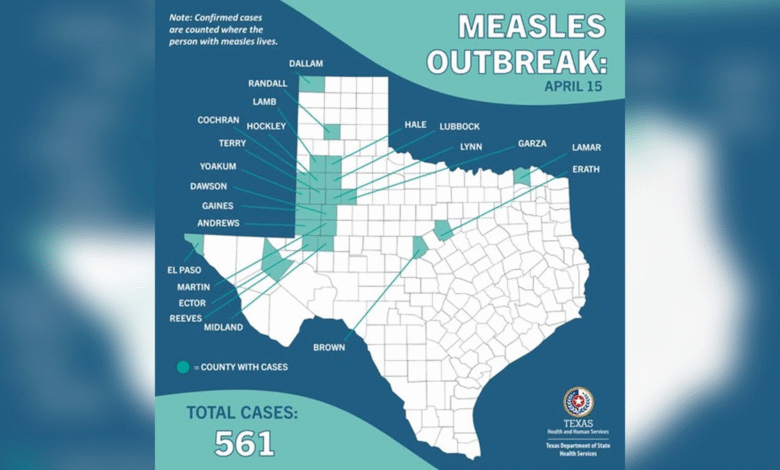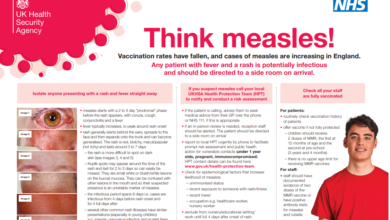Measles Outbreak: Michigan Reports New Cases in 2025

In 2025, a significant measles outbreak has emerged, marking Michigan’s first cases in five years. The Michigan Department of Health and Human Services (MDHHS) confirmed this alarming resurgence, emphasizing the necessity for widespread measles vaccination. As the Centers for Disease Control and Prevention (CDC) reports a staggering 712 confirmed cases nationwide, the urgency for the MMR vaccine cannot be overstated. Measles symptoms, which include fever, cough, and rash, can rapidly manifest and spread, underscoring the virus’s contagious nature. As health officials continue to monitor measles transmission, they encourage residents to verify their vaccination status to protect themselves and their communities, especially amid a backdrop of heightened vulnerability.
Recently, the resurgence of the measles virus has raised alarms across the United States, particularly in states like Michigan, which has declared its first cases since 2019. This situation highlights an increase in measles infections and reflects the growing concern over vaccine-preventable diseases. Commonly known for its rapid transmission, measles poses a serious public health threat, especially amongst unvaccinated populations. As authorities, including the Michigan health department, urge individuals to prioritize vaccinations like the MMR, understanding the signs and symptoms of measles has become crucial for prevention. The ongoing outbreak serves as a reminder of the importance of collective immunity through proper vaccination.
Understanding Measles Outbreaks in the U.S.
Measles outbreaks are defined by the Centers for Disease Control and Prevention (CDC) as instances where three or more cases share the same source of infection. In 2025, the alarming resurgence of measles has been noted, with outbreaks registered in eight states, including Michigan. These outbreaks have raised concerns among public health officials, who stress that measles is incredibly contagious, spreading rapidly among unvaccinated populations.
In Michigan, two separate outbreaks have been reported as of April 2025. The first case was identified in Oakland County on March 14, followed closely by an outbreak in Montcalm County. Notably, the recent detections mark the first outbreak in Michigan since 2019, highlighting the importance of ongoing public health vigilance. Preventative measures, such as vaccination through the MMR vaccine, are essential to curb further transmission.
Measles Symptoms and What to Watch For
Recognizing the symptoms of measles is vital for swift identification and response. Common symptoms include a high fever, cough, runny nose, red and watery eyes, and a characteristic rash that begins on the face before spreading to other parts of the body. Notably, symptoms can manifest seven to fourteen days after exposure, which makes diagnosing the condition challenging yet crucial.
Due to its highly transmissible nature, individuals who are unvaccinated are at a much higher risk of contracting measles. Medical professionals emphasize the importance of vaccination records being up to date, particularly for school-aged children, who have been disproportionately affected by recent outbreaks. Knowing these symptoms can help parents and guardians act quickly, should their children show signs of infection.
The Importance of MMR Vaccination in Measles Prevention and Control
The MMR vaccine, which stands for measles, mumps, and rubella, remains the most effective shield against the measles virus. Public health authorities recommend that individuals receive two doses of the MMR vaccine, which can provide up to 97% protection against measles. This is particularly important in light of the recent outbreaks reported in Michigan and other states across the country.
Health organizations, including the Michigan Department of Health and Human Services (MDHHS), stress that vaccination is the best defense against the spread of measles. They encourage families to verify that their vaccination status is current, especially as outbreaks are occurring. Accessible options for vaccination are available at local pharmacies, healthcare providers, and health departments, making it easier for individuals to protect themselves and their communities.
Mitigating Measles Transmission: Public Health Strategies and Recommendations
As Michigan and other states face rising cases of measles, public health departments are implementing various strategies to mitigate transmission. These include enhancing public awareness campaigns regarding the symptoms of measles and the necessity of vaccination with the MMR vaccine. Health officials also advise extensive contact tracing to identify and notify individuals who may have been exposed to confirmed cases.
In addition, MDHHS is continuously monitoring potential new exposure sites and advising the public about preventive measures to avoid infection. The cooperation between state health departments and communities is crucial in managing outbreaks effectively. By prioritizing vaccinations and adhering to health recommendations, the risk of measles transmission can be significantly reduced.
The Role of Community Immunity in Preventing Measles Outbreaks
Community immunity, often referred to as herd immunity, plays a crucial role in preventing measles outbreaks. For measles, the threshold for herd immunity is approximately 95%, meaning that a sufficient majority of the population must be vaccinated to protect those who are unvaccinated. The recent outbreaks illustrate the vulnerabilities that arise when vaccination rates drop.
As vaccination gaps widen, the likelihood of outbreaks increases notably. Health organizations propose initiatives to educate communities about the significance of maintaining high vaccination coverage, particularly for school-aged children who are often the most affected by the disease. By fostering an environment of immunity protection, we can better safeguard our populations against the threat of measles outbreaks.
Impact of Measles Outbreaks on Public Health Systems
The recent outbreaks of measles, such as those reported in Michigan, pose significant challenges to public health systems. An increase in measles cases often strains resources, as health departments must allocate more personnel and funding towards outbreak management, vaccination campaigns, and public education initiatives. This challenge is compounded when outbreaks coincide with the healthcare needs of other communities.
Additionally, rising cases of measles can lead to increased hospitalizations, which further burdens healthcare facilities already responding to high patient volumes. Public health officials appeal to individuals to remain vigilant about vaccination, highlighting that collective effort can alleviate stress on health systems and protect community health.
Future Projections: Trends in Measles Infection Rates and Vaccination Efforts
As we advance through 2025, analyzing current trends in measles infection rates reveals sobering statistics. The CDC has documented over 700 cases of measles across the U.S., suggesting a concerning resurgence of this historically controlled disease. Predictions indicate that unless vaccination rates improve, we may witness an escalation in measles outbreaks, primarily among unvaccinated populations.
Public health responses now must focus on improving community awareness and accessibility to vaccines, implementing proactive measures to enhance vaccination uptake. Educational campaigns targeting various demographics are vital to ensure that individuals understand the benefits of vaccination, specifically with the MMR vaccine. By taking collective action now, we can work towards reversing the current trend of measles transmission.
Frequently Asked Questions
What is the current status of the measles outbreak in Michigan?
As of April 2025, Michigan has reported its first measles outbreak in five years, with a total of eight cases confirmed across the state, including outbreaks in Oakland and Montcalm counties.
How does the measles outbreak spread and why is it contagious?
Measles is extremely contagious, spreading through respiratory droplets from coughing or sneezing. It can remain airborne for up to two hours, making it easy for unvaccinated individuals to contract the virus during a measles outbreak.
What are the symptoms of measles that residents should be aware of during an outbreak?
During a measles outbreak, symptoms to watch for include fever, cough, runny nose, red and watery eyes, and a distinctive rash that begins on the face and spreads throughout the body.
What role does the MMR vaccine play in preventing measles during an outbreak?
The MMR vaccine—protecting against measles, mumps, and rubella—is the most effective tool in preventing measles transmission. Two doses of the MMR vaccine provide 97% protection against measles, making vaccination essential during outbreaks.
How can I ensure I am protected against the measles outbreak in my community?
To protect against the ongoing measles outbreak, check with your health provider to verify your vaccination status. Individuals aged one year and older should receive the MMR vaccine, which is available at healthcare offices, pharmacies, and local health departments.
What is the significance of measles outbreaks in multiple states including Michigan?
The emergence of measles outbreaks in various states, including Michigan, highlights public health concerns about vaccine coverage and the risk of transmission among unvaccinated populations, particularly school-aged children.
Where can I find more information about the measles outbreak and vaccination options?
For more details regarding the measles outbreak, including vaccination locations and public health recommendations, residents can visit the Michigan Department of Health and Human Services website or contact their local health department.
What should parents know about measles vaccinations for children during an outbreak?
Parents should ensure their children are up-to-date with the MMR vaccine, especially during a measles outbreak. Vaccination is crucial in preventing the spread and protection against severe symptoms associated with measles.
| Key Point | Details |
|---|---|
| Current Outbreaks | Measles outbreaks declared in Michigan and seven other states including Texas, New Mexico, Kansas, Ohio, Indiana, Pennsylvania, and California. |
| Michigan’s First Outbreak | Michigan’s first measles outbreak since 2019 with a total of 8 cases confirmed in 2025. |
| CDC Definition of Outbreak | An outbreak is defined as three or more cases sharing a source of infection. |
| Contagiousness of Measles | Measles is reported to be more contagious than COVID-19. Unvaccinated children are at the highest risk. |
| Prevention | The MMR vaccine offers 97% protection against measles; health officials urge vaccination. |
| Symptoms of Measles | Common symptoms include fever, cough, watery eyes, runny nose, and a rash starting on the face. |
| Vaccination Availability | Vaccines are available at doctors’ offices, most pharmacies, and local health departments. |
Summary
The recent measles outbreak has been a significant public health concern, with outbreaks officially declared in eight states, including Michigan. This serious illness has shown its highly contagious nature, primarily affecting unvaccinated individuals. Health officials emphasize the necessity of the MMR vaccine to ensure community protection. Measures are being taken to increase vaccination rates and prevent further incidence of this preventable disease.




